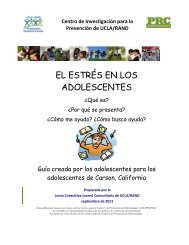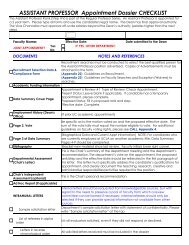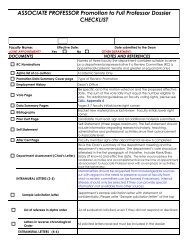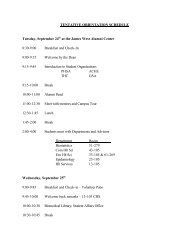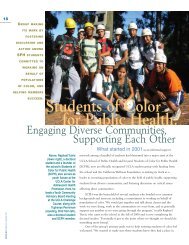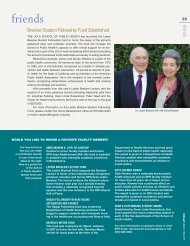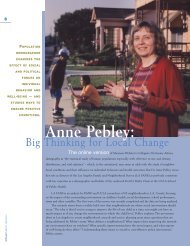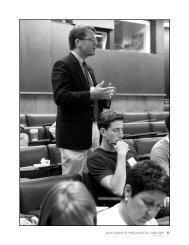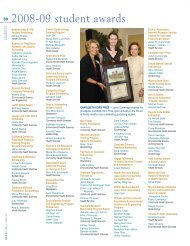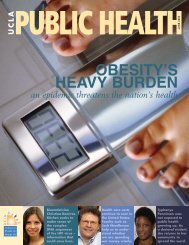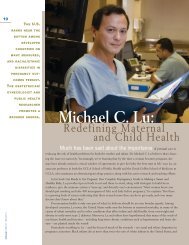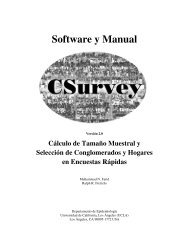JUNE 2001 - UCLA School of Public Health
JUNE 2001 - UCLA School of Public Health
JUNE 2001 - UCLA School of Public Health
You also want an ePaper? Increase the reach of your titles
YUMPU automatically turns print PDFs into web optimized ePapers that Google loves.
Pillars <strong>of</strong> the<br />
Community<br />
FOUR YEARS AGO,<br />
ROBERT AND<br />
MARION WILSON<br />
(ABOVE) MADE A<br />
GENEROUS DONATION<br />
TO SUPPORT<br />
STUDENTS IN<br />
COMMUNITY-BASED<br />
HEALTH IMPROVE-<br />
MENT EFFORTS.<br />
THE IMPACT OF<br />
THEIR GIFT CAN<br />
BE SEEN IN<br />
NEIGHBORHOODS<br />
ACROSS THE<br />
REGION.<br />
While a student at the <strong>UCLA</strong> <strong>School</strong><br />
<strong>of</strong> <strong>Public</strong> <strong>Health</strong>, Rachel Gonzales gave something back to the community in<br />
which she was raised. Gonzales and fellow M.P.H. student Mehrnaz Davoudi,<br />
working with the El Monte Union <strong>School</strong> District in Los Angeles’ San Gabriel<br />
Valley, implemented a school-based anti-tobacco program. Project E.M.P.A.C.T.<br />
(Empowerment and Media Prevention Advocacy for Controlling Tobacco) included<br />
an eight-week media literacy program for 10th graders, designed to increase<br />
awareness and knowledge <strong>of</strong> the influence <strong>of</strong> advertising and other media on<br />
tobacco use.<br />
“By instilling in the students critical thinking skills and the ability to decipher<br />
hidden messages in tobacco-company advertisements that targeted them, we hoped<br />
to change attitudes and decrease their<br />
tobacco use,” Gonzales explains.<br />
While Gonzales and Davoudi are<br />
still analyzing their results, the anecdotal<br />
evidence indicates that the program<br />
made a strong impact. “The<br />
change in the students from the beginning<br />
<strong>of</strong> the program to the end was<br />
very exciting,” Gonzales says. “They<br />
started out very reserved, because<br />
they’re used to the traditional format<br />
<strong>of</strong> listening to the teachers. By the end,<br />
they were much more actively<br />
involved, and were very anti-tobacco.<br />
They became advocates themselves.”<br />
Project E.M.P.A.C.T. is one <strong>of</strong><br />
nearly four dozen <strong>UCLA</strong> <strong>School</strong> <strong>of</strong> <strong>Public</strong> <strong>Health</strong> student-initiated projects to<br />
make an impact on poor and underserved populations in Southern California<br />
communities since 1998. In 1997, <strong>UCLA</strong> alumni Robert and Marion Wilson<br />
made a generous gift to the <strong>School</strong> to provide internship stipends for students<br />
working in community-based health improvement efforts, particularly among<br />
the region’s poor and underserved. The gift enabled the <strong>School</strong> to establish the<br />
Community <strong>Health</strong> Promotion Program, which has supported 46 innovative<br />
public health projects, planned and implemented by the <strong>School</strong>’s students in<br />
conjunction with local community agencies (see the list on the next page).<br />
“Projects were extremely varied in topic and scope, but they shared the<br />
common goal <strong>of</strong> providing assistance to populations in need,” says Kirstin<br />
Chickering <strong>of</strong> the <strong>School</strong>’s Office <strong>of</strong> <strong>Public</strong> <strong>Health</strong> Practice, who administered<br />
the program. “The addition <strong>of</strong> this innovative program has enabled <strong>UCLA</strong>’s<br />
<strong>Public</strong> <strong>Health</strong> Practice Program to become a national model for public health<br />
schools throughout the country.”<br />
The underserved individuals and organizations targeted by the projects<br />
weren’t the only ones to benefit. Participating students spoke <strong>of</strong> the richness <strong>of</strong><br />
In Project E.M.P.A.C.T., initiated<br />
by two <strong>UCLA</strong> <strong>School</strong> <strong>of</strong><br />
<strong>Public</strong> <strong>Health</strong> students, high<br />
school students find tobacco<br />
ads in their libraries, then conduct<br />
“ad-busting” sessions in<br />
which they discuss the facts<br />
not mentioned in the ads.<br />
19<br />
feature <strong>UCLA</strong>PUBLIC HEALTH



